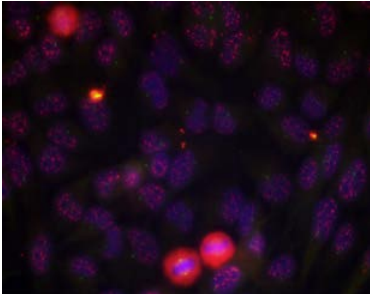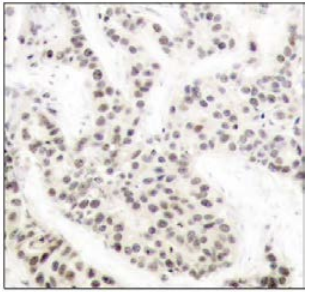Anti-Elk1 (phospho-Thr417) Antibody (43038)
Data
- -
- -
Antibody DetailsProduct DetailsReactivity Species Human ⋅ Mouse ⋅ Rat Host Species Rabbit Immunogen Peptide sequence that includes phosphorylation site of threonine 417 (L-S-T(p)-P-V) derived from human Elk1 and conjugated to KLH. Product Concentration 1.0 mg/ml Formulation PBS (without Mg2 and Ca2 ), pH 7.4, 150mM NaCl, 0.02% sodium azide and 50% glycerol. State of Matter Liquid Product Preparation Affinity-purified on phosphopeptide; non-phosphopeptidereactive antibodies were removed by chromatography on non-phosphorylated peptide Storage and Handling This antibody is stable for at least one (1) year at -20°C. Country of Origin USA Shipping Next Day 2-8°C Applications and Recommended Usage? Quality Tested by Leinco Immunohistochemistry: use at dilution of 1:50- 1:100. Immunofluorescence: use at dilution of 1:100- 1:200. These are recommended working dilutions. End user should determine optimal dilutions for their applications. Each investigator should determine their own optimal working dilution for specific applications. See directions on lot specific datasheets, as information may periodically change. DescriptionSpecificity Rabbit Polyclonal Antibody specific to Elk1 (phospho-Thr417) Background Elk-1 is a member of the Ets family of transcription factors and of the ternary complex factor (TCF) subfamily. Proteins of the TCF subfamily form a ternary complex by binding to the serum response factor and the serum reponse element in the promoter of the c-fos proto-oncogene. The protein encoded by this gene is a nuclear target for the ras-raf-MAPK signaling cascade. Alternatively spliced transcript variants encoding the same protein have been found for this gene. Antigen DetailsFunction Transcription factor that binds to purine-rich DNA sequences. Forms a ternary complex with SRF and the ETS and SRF motifs of the serum response element (SRE) on the promoter region of immediate early genes such as FOS and IER2. Induces target gene transcription upon JNK-signaling pathway stimulation (By similarity). {UniProtKB:A4GTP4, PubMed:1630903, PubMed:7889942}. NCBI Gene Bank ID UniProt.org Research Area Phosphospecific Antibodies References & Citations |




